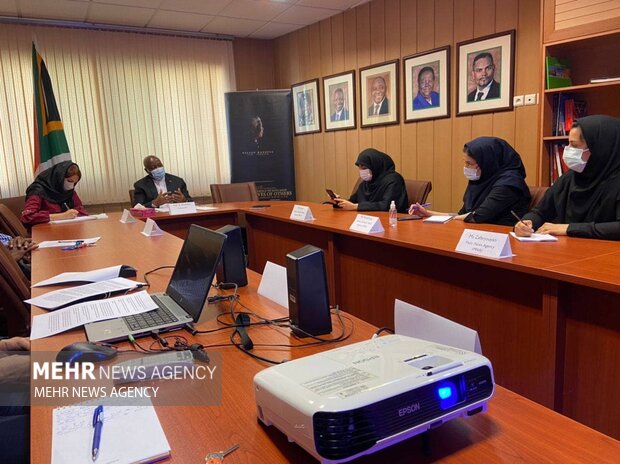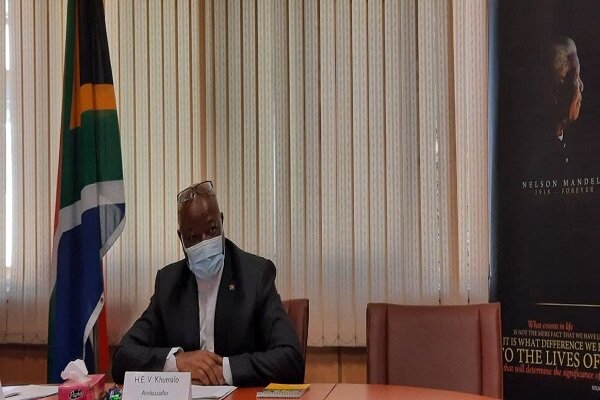In a press conference held on Monday in the South African Embassy, South Africa's Ambassador to Iran Vika Mazwi Khumalo and his colleagues answered questions raised by Iranian reporters on a wide range of topics.
South Africa’s positions on Palestinian issue
"South Africa’s position on the Palestinian question is informed, in general, by three broad issues, namely: Firstly, South Africa’s own history, not only the injustices people had to suffer under Apartheid but also Africa’s history of colonialism and exploitation. The Palestinians are facing a situation where they remain deprived of their human rights and the denial of their dignity, similar to what was experienced by South Africans.
Secondly, South Africa’s constitution guarantees certain fundamental freedoms, including the rights to freedom of expression, religious freedom, and access to justice. These are rights are denied to Palestinians in the Occupied Territories. Thirdly, International Law, where we continue to see a total disregard for successive United Nations Security Council (UNSC) resolutions that call for an end to the occupation of Palestinian land and for the fulfilment of the rights of the Palestinian people.
South Africa’s position remains that the international community must uphold international law and exert and intensify efforts in support of the Palestinian cause, in accordance with the relevant UN resolutions, UN Charter, and the tools and legal frameworks provided by multilateral diplomacy and international law. It is in this regard that South Africa and the Islamic Republic have committed to cooperate to support the legal and legitimate demands of the Palestinian people," the ambassador said to Mehr News correspondent.

Future of Iran, South Africa’s economic, trade, political coop. under Iran’s new administration
He also told Mehr News correspondent about Iran and South Africa’s economic, trade, political cooperation, "The depth of the relations between South Africa and the Islamic Republic of Iran established a broad political mechanism in 1995, called the Joint Commission. The Joint Commission is chaired by the Ministers responsible for Foreign Affairs and guides the political and economic interactions between the two countries. It addresses a very wide spectrum of cooperation, in areas such as energy, banking, and finance, health, agriculture, water and sanitation, cultural heritage, tourism science and technology, education, the environment, and so forth. The Joint Commission has concluded approximately 24 active agreements between the two countries during the same period.
South Africa was also the first resident Ambassador to Iran to officially meet with Minister Amir-Abdollahian following his appointment as the Minister of Foreign Affairs.
Therefore, it is evident that the two countries continue to share a deep relationship that continues to be valued and prioritised by both. The change of administration will not influence this relationship, specifically since it is also supported and strengthened through various agreements.
Unfortunately, the COVID pandemic and difficult international environment have caused that some of the targets we set out to reach, such as increasing trade to US$2 billion per annum, likely will not be reached within the allocated timeframes.
However, South Africa remains committed to its relationship with Iran and the expansion of this relationship. The Embassy continues to engage and identify opportunities, specifically economic, that could be pursued despite the current imposed challenges. The two countries are already engaging and have initiated processes to ensure that the Joint Commission will be hosted in South Africa during 2022 and that its preparatory and intersessional activities continue in order to review the various sectors, our continued priorities, finalise outstanding agreements and also review existing agreements and cooperation. "
Fields of cooperation between Iran, South Africa in next joint commission
Regarding Iran- South Africa's next joint commission, the ambassador told Mehr News, "As indicated, the two countries have started processes towards the hosting of the Joint Commission in South Africa during 2022. This includes discussions and preparations towards the hosting and interaction of the various technical committees associated with the Joint Commission as well as its inter-sessional mechanism, the Deputy Ministerial Working Group – which will be hosted by the Islamic Republic.
The Joint Commission addresses a wide spectrum of areas of cooperation. Each of these areas includes specific technical working groups, such as the Working Group on Science and Technology, as an example.
Therefore, although the Joint Commission had identified and continues to identified priority areas, such as previously mentioned, each of these technical working groups (comprising the experts from each country in that particular area) will identify the specific priorities the two countries would target or need to review. Therefore, it is an ongoing process in the pursuit of deepening relations and cooperation."
The followings are the South African envoy's answers to other Iranian reporters attending the press conference:
President Raeisi’s visit to South Africa in 2022
"President Ramaphosa extended an invitation to former President Rouhani to visit South Africa during 2020. Unfortunately, this visit could not take place due to the lockdowns and restrictions that had to be imposed due to the COVID-19 global pandemic.
The invitation follows from the visit to Iran by former South African President JG Zuma in 2016. As already stated, South Africa and the Islamic Republic intend to host the 15th Meeting of the Joint Commission in South Africa in 2022.
It is within this context that both countries are currently discussing the possible visit of President Raeisi to South Africa, but no dates have yet been proposed or confirmed.
The two leaders will continue to pursue the objectives that South Africa and the Islamic Republic have committed to since 1995. This does not only include continued political cooperation but also exploring ways in which to increase economic interaction between the two countries, within the current difficult international space imposed on Iran. The two countries are also working towards finalizing several agreements that could possibly be signed during the Joint Commission or during the State Visit."
Current trade level between Iran and South Africa
"Sources indicate that the trade between Iran and South Africa for 2020 amounted to approximately US$37 million. In general, trade during 2020 significantly declined and these figures should also be viewed within the context of a restrictive environment, specifically since 2018, that was exacerbated by the COVID-19 pandemic and the global economic downturn. All of this has unfortunately contributed to an overall decline of approximately 14% in trade volumes with African countries during 2020. Some significant South African investments in specific sectors in the Islamic Republic of Iran could also not be continued.
However, trade between the two countries has started to recover based on the partial economic statistics released for 2021.
The overall situation and trend observed remain unfortunate, specifically since South Africa and Iran had agreed in 2016 to work towards escalating the overall economic interaction between the two countries to US$2 billion per annum. Furthermore, some significant investments, such as in the telecommunications industry have continued and are also not included in the traditional product figures mentioned."
Main obstacles for Iranian, South African private-sector traders
"The main obstacle currently relates to the unilateral sanctions imposed on Iran and their secondary potential to businesses wishing to engage with the Islamic Republic.
Unfortunately, we find that the impression is created that doing business with Iran may be too risky or that economic interaction may not be possible due to the sanctions and their impacts. However, the Embassy continues to exert a great deal of effort in identifying opportunities and continuing to advise, together with Ministries in South Africa, on continued economic engagements, regardless of the unilateral sanctions and their effects.
Despite these difficulties, the Islamic Republic continues to offer many opportunities in many areas that are not subject to unilateral sanctions. Despite these obstacles, a substantial amount of interaction continues between the two countries."
Interview and report by Zahra Mirzafarjouyan
